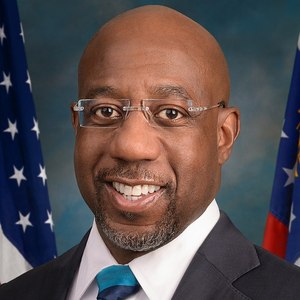Warncok introduces bill to boost funding for SAF grant program

June 20, 2023
BY Erin Krueger
Sen. Raphael Warnock, D-Ga., on June 13 introduced the Advancing Aviation Emissions Reduction Opportunities (AAERO) Act, which aims to alter some provisions of a sustainable aviation fuel (SAF) grant program included in the Inflation Reduction Act and boost the program’s funding.
The IRA was signed by President Biden in August 2022. Section 40007 of the legislation directs the Secretary of Transportation to implement a “competitive grant program for eligible entities to carry out projects located in the United States that produce, transport, blend, or store sustainable aviation fuel, or develop, demonstrate, or apply low-emission aviation technologieas.” It also allocates nearly $245 million for projects relating to production, transportation, blending or storage of SAF; nearly $47 million for projects to develop, demonstrate, or apply low-emission aviation technologies; and nearly $6 million for program oversight. The DOT is working to implement the grant program, known as the FAST-SAF program.
Warnock’s bill aims to make several changes to the grant program. One change specifies that in implementing the program, the DOT should consider the importance of using grants to assist with capital expenditures for facilities deploying technologies that are scalable and can help meet long-term SAF production goals established under the Sustainable Aviation Fuel Grand Challenge Memorandum, which was issued by Biden in September 2021.
Advertisement
The IRA’s original language directed the DOT to adopt at least one methodology for testing lifecycle greenhouse gas (GHG) emissions reductions of SAF. Warnock’s bill alters that provision of the law specifying that the GHG reduction value can be determined any one or more specified methods, including the use of Argonne National Laboratory’s GREET model; the most recent carbon offsetting and reduction scheme for international aviation adopted by the International Civil Aviation Organization; or any similar methodology that satisfies criteria identified under certain Renewable Fuel Standard regulations.
The AAERO Act also includes provisions that alter language related to the grant program’s definitions of lifecycle GHG emissions and SAF. In addition, it allocates an additional $489 million in fiscal year (FY) 2024 funding for projects relating to the production, transportation, blending or storage of SAF; an additional $210 million for projects relating to low-emission aviation technologies; and $4 million for program oversight.
A statement released by Warnock’s office indicates the AAERO Act would ramp up production of SAF and other low emissions aviation technologies with critical investments in new facilities and scalable technology in order to meet our national climate goals and eliminate aviation sector emissions by 2050.
Advertisement
Delta Air Lines and LanzaJet are supporting the bill. “Delta Air Lines applauds the leadership of Senator Warnock to grow the nascent market for sustainable aviation fuel (SAF) and looks forward to continued engagement on policies that will reduce lifecycle greenhouse gas (GHG) emissions within the aviation sector,” said Pam Fletcher, chief sustainability officer, Delta Air Lines. “At Delta we have committed to replacing 10 percent of our traditional fossil fuel with SAF by 2030, but in order to achieve this important goal we need sensible policies like the AAERO Act that will help spur investment and deployment of lower carbon intensity fuels and technologies.”
“As a sustainable aviation fuels company building a plant in rural Georgia, LanzaJet applauds this work. The aviation industry has the opportunity to decarbonize the entire sector, and the AAERO Act would catalyze and de-risk the scale-up of a US sustainable aviation fuel (SAF) market,” said Jimmy Samartzis, CEO, LanzaJet. “The AAERO Act represents a bold commitment to decarbonize aviation and supports the Administration’s goal of three billion gallons of U.S. SAF production by 2030. This work not only supports important climate change efforts, it also enables energy security and builds economic development across rural America. We applaud Senator Warnock for his leadership in introducing the AAERO Act and supporting a future net zero aviation industry.”
A full copy of the AAERO Act is available on Warnock’s website.
Related Stories
CountryMark on July 22 celebrated the completion of more than $100 million in upgrades at its refinery in Indiana, including those related to soybean oil storage. The facility produces renewable diesel via coprocessing technology.
ATOBA Energy and Air Moana are partnering to implement scalable solutions for the supply of SAF. The collaboration aims to ensure long-term SAF availability while supporting local initiatives to develop sustainable fuel production in Tahiti.
While final IRS guidance is still pending, the foundation of the 45Z program is well defined. Clean fuel producers should no longer be waiting; they can now move forward with critical planning and preparation, according to EcoEngineers.
Neste Corp. on July 24 released second quarter results, reporting record quarterly renewable product sales volumes despite weaker margins. SAF sales were up nearly 80% when compared to the first quarter of 2025.
Valero Energy Corp. on July 24 released second quarter results, reporting a profitable three-month period for its ethanol segment. The renewable diesel segment posted a loss, but the company’s new sustainable aviation fuel (SAF) unit operated well.
Upcoming Events










